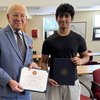12% of GCSD special-needs students in contained classrooms
The Enterprise — Melissa Hale-Spencer
Stephen Hadden, Guilderland’s administrator for special programs, tells the school board about programs for the 89 students in self-contained classrooms, grouped together with similar needs. Superintendent Marie Wiles said his report was one of a series to look at academic programs to answer the question: What are the goals and are we meeting them?
GUILDERLAND — The school board meeting on Oct. 22 ended with Scoutmaster Sam Dikeman explaining why Troop 50 — with many of the boys wearing uniforms — had decided to attend.
“We went to two different town board meetings and they agreed with each other all the way through,” Dikeman said, noting that part of learning about democracy was seeing disagreements.
The school board meeting had opened with Kerry Dineen, a music teacher at Pine Bush Elementary School and the building’s president, describing the “angst and anxiety” at the school. She focused on “a small issue I think you can fix,” urging the board, which had been deeply divided on the issue, to restore the cut pay for substitute teachers.
“We’re the last place they’ll say ‘yes’ to,” said Dineen, stating it was embarrassing for the district, which has the longest school day, to pay less, and it’s hard to find substitutes.
The heart of the meeting was devoted to a report presented by Stephen Hadden, the administrator for special programs, on special-education classes. The district has 736 school-aged students with disabilities — 89 of them, or 12 percent, are supported through self-contained special classes, where students are grouped together because of a similarity of needs. Seven of them have teaching assistants.
Additionally, Guilderland supports 66 students in special-class programs, provided through the Board of Cooperative Educational Services and at private schools, with needs that cannot be met in the district’s programs.
Altogether, Guilderland has 11 special classes. Three classes, with students from throughout the district, meet at Lynnwood Elementary, two at Altamont Elementary, three at the middle school, and three at the high school.
Summarizing outcomes in his report, Hadden said, students rarely reach proficiency in the state-required English and math tests. “Curriculum is modified to teach the basic skills and knowledge needed to perform well on assessments although often,” Hadden said, “they are being instructed at level below their chronological grade level. When assessed, they must be administered the test that matches their chronological grade level.”
The few students eligible for the state’s alternate assessment — those with severe cognitive disability and deficits in communication and adaptive behavior — are tested in ways that are individualized and connected to their abilities, Hadden said.
“A second and reliable indicator of success is analyzing the mastery of goals created for individual students,” he said. Each student with a disability has an Individual Education Program (IEP) with annual goals measured quarterly. “Success is achieved when a student masters their goals,” Hadden said. “On that measure, our students perform very well.”
From kindergarten through eighth grade, school programs parallel the general-education curriculum and provide communication skills.
In high school, students in special classes choose a Skills and Achievement Commencement Credential (SACC) or a Career Development and Occupational Studies (CDOS) Commencement Credential.
Starting in June, the SACC will replace the IEP diploma and must include hours in career preparation, and, instead of Regents exams, students will take alternate assessments.
Parents, Hadden said, have already expressed concerns that it will be harder for their children to get jobs after high school with a “credential” instead of a diploma
But, Hadden told the board, he believes the credential will show the student is employable and has skills to work at a job.
“Once employers learn that,” he said, “I think there’ll be more acceptance in the work place.”
Special-needs students may stay in school until they turn 21, extending high school from four to seven years.
Guilderland students generally attend high school for six or seven years, Hadden said. Beginning in their third year, they go into the community for “job sampling,” he said, where they visit various workplaces — such as grocery stores, restaurants, or animal clinics — to observe for three afternoons each week.
In their fourth year, they start working four afternoons a week, with the workplace changing three times each year. Students also take a weekly class to learn such skills as how to accept criticism, and how to interact positively with co-workers and supervisors.
Hadden reviewed four years of Guilderland data, from 2004 to 2008, for 47 students who entered Guilderland High School. Thirty left with IEP diplomas, eight moved to other districts, four are still in the program, two withdrew, one was placed out of the district, and two died. None of them moved out of a special class.
Hadden also surveyed 27 parents, and got eight responses, a number he found disappointing. Two said their children were employed; one was living independently, one was living in a supported apartment; six were receiving adult services, and five were living at home.
Among the successes in the program, Haden said, “The piece you really can’t put your finger on…They resist it,” he said of being put in a self-contained classroom. “Six months later, they feel very comfortable…They don’t feel alone…A lot of these students connect and stay friends for life. It’s wonderful to watch.”
Listing parts of the program that need attention, Hadden said, speech services should be imbedded, specialized training is needed for teaching assistants, requirements to teach Common Core Standards must be balanced with activities of daily living, there should be a better student-to-staff ratio, and there is a lack of electives for high school students.
Hadden noted that the graduation rate for students with disabilities for the 2011 Guilderland cohort was 72.5 percent, which exceeded the state standard of 53 percent. The remaining percentage would include students who withdrew from school or had been granted an IEP diploma.
Hadden concluded that Guilderland, with 14.2 percent of students with disabilities in special classes, is consistently under the state-set threshold of 24.3 percent. He also noted that a high number complete high school and meet their individual goals, and that their parents are generally satisfied with the program.
“The Guilderland Central School District has a long tradition of meeting the needs of all students with disabilities with supports and programs that are truly individualized for each learner,” Hadden concludes his report. “With recent financial challenges, our teachers and related service providers continue to be dedicated to this belief and continue to find ways to assist our most needy students meet with success.”
Board President Barbara Fraterrigo praised the self-contained classes she had observed at Lynnwood Elementary with what she described as a “diverse group of students” with a variety of emotional and physical needs.
Hadden praised the “veteran staff.” He said, “They’ve seen it all. I’m very proud of them.”
Other business
In other business, the board:
— Heard praise from Superintendent Marie Wiles for performing “the very difficult task of governing” the district. “I don’t believe people truly understand,” she said. In honor of School Board Recognition Week, each of the nine board members was presented with a book selected in their name to reflect their interests to be donated to one of the district’s school libraries;
— Heard from Assistant Superintendent for Curriculum Demian Singleton that Guilderland alumna Liz Zunon won a Gelett Burgess award for her first children’s book, My Hands Sings the Blues, Romare Bearden’s Childhood Journey;
— Reviewed materials on a new way elementary students are learning about words, combining phonics, vocabulary, and spelling, called “Words Their Way”;
— Heard congratulations for Farnsworth Middle School student Conor Quinn who won a Student Research Award for Nyet: How One Word was a Turning Point in History;
— Heard from Assistant Superintendent for Business Neil Sanders that on Nov. 6, districts residents may tell the board their views on the development of the 2014-15 school budget;
— Received a state-required annual update on risk assessment, noting “some areas where the district could improve the internal control structure.” The audit was conducted by Questar III (the Rensselaer-Columbia-Greene) BOCES;
— Heard from Wiles that district enrollment is at 4,925. “All in all, we’re relatively flat,” she said;
— Corrected the 2013 tax roll, which consisted of a $521 change for an exemption not being applied to a piece of residential property, and $55,337.75 in taxes from CSX Transportation Inc. The town’s assessor, Karen Van Wagenen, wrote, in a form, that the additional tax money from the railroad was because “in error the assessed value was changed instead of the exemption value.” Sanders said the money would go into the district’s fund balance;
— Extended by one year a bid award to Coyne Textile Services for uniform, mop, and mat service at an estimated annual cost of $20,308.92;
— Accepted a donation of weight-training equipment from Christine Kiernan;
— Approved a new high school club called Invest in Your Future to be advised by Joan McGrath for no pay;
— Approved an exchange program with students in Mainz, Germany for April 2014, overseen by Hanna Hickey, who teaches German at Guilderland; and
— Heard doubts from board member Colleen O’Connell about whether the board should hold its annual planned retreat since only six members had filled out a questionnaire to allow the retreat’s facilitator to design the program.
“I am very frustrated by a number of board members’ lack of preparation,” she said.
“We have to be responsible for each other,” agreed board member Gloria Towle-Hilt. She had served as the board’s vice president in recent years while O’Connell served as president. “It’s embarrassing,” said Towle-Hilt of the lack of preparation.
“Frustrating, perhaps,” responded the current president, Fraterrigo, “but that’s the purpose of the meeting.”
“To be frustrated?” asked O’Connell.
“We all need to be committed to doing the work,” said Towle-Hilt. “We need to be there for each other to make it work…Otherwise, we’ll be working against each other.”
“The whole idea is to be a team,” said Fraterrigo.
“I am a team player,” said O’Connell. She also said, “People are abstaining from participation in negotiations in executive sessions…” and
Met in executive session.


